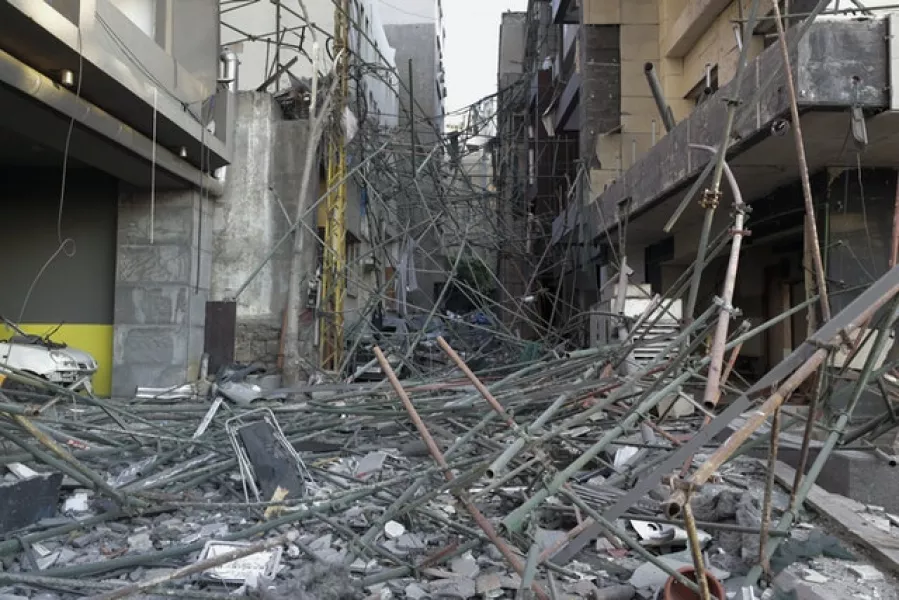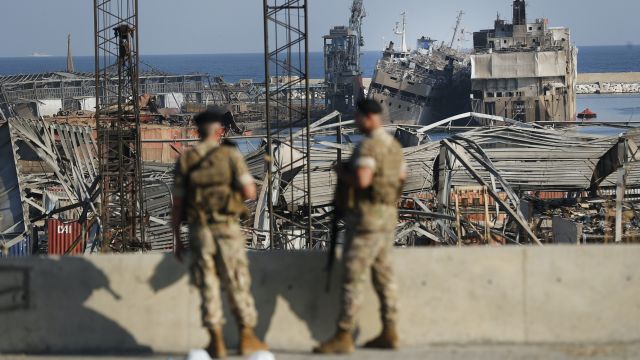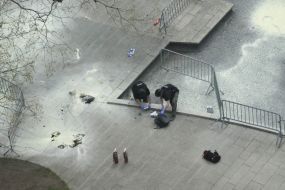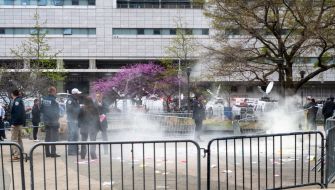The blast, which appeared to have been caused by an accidental fire that ignited a stockpile of ammonium nitrate at the port, rippled across the Lebanese capital, killing at least 135 people, injuring more than 5,000 and causing widespread destruction.
It could also accelerate the country’s coronavirus outbreak as hundreds of thousands of people have been forced to move in with relatives and friends after their homes were damaged, further raising the risks of exposure.
French President Emmanuel Macron arrived on Thursday amid pledges of international aid and tweeted: “Lebanon is not alone.”
He plans to visit the devastated port and meet officials.
But Lebanon, which was already mired in a severe economic crisis, faces a daunting challenge in rebuilding.
It is unclear how much support the international community will offer the notoriously corrupt and dysfunctional government.
Losses from the blast are estimated to be between 10 billion to 15 billion US dollars, Beirut governor Marwan Abboud told the Saudi-owned TV station Al-Hadath on Wednesday, adding that nearly 300,000 people are homeless.
The tiny Mediterranean country was already on the brink of collapse, with soaring unemployment and a financial crisis that has wiped out people’s life savings.
Hospitals were already strained by the coronavirus pandemic, and one was so badly damaged by the blast it had to treat patients in a nearby field.

Anger is mounting against the political class that has dominated the country since the 1975-1990 civil war, which has long been seen as hopelessly corrupt and incapable of providing even basic services like electricity and trash collection.
The investigation is focusing on how 2,750 tons of ammonium nitrate, a highly explosive chemical used in fertilisers, came to be stored at the facility for six years, and why nothing was done about it.
The Port of Beirut and customs office are notorious for being among the most corrupt and lucrative institutions in Lebanon, where various factions and politicians, including the Iran-backed Hezbollah militant group, hold sway.
Fuelling speculation that negligence was to blame for the accident, an official letter circulating online showed the head of the customs department had warned repeatedly over the years that the stockpile of ammonium nitrate was a danger and had asked judicial officials for a ruling on a way to remove it.

The cargo had been stored at the port since it was confiscated from a ship years earlier.
Based on the timeline and the size of the cargo, that ship could be the MV Rhosus.
The ship was initially seized in Beirut in 2013 when it entered the port due to technical problems, according to lawyers involved in the case.
It came from the nation of Georgia, and had been bound for Mozambique.
The stockpile is believed to have detonated after a fire broke out nearby.
It caused the most powerful blast ever seen in the city, which has survived decades of war and conflict.
Several city blocks were left littered with rubble, broken glass and damaged vehicles.

Authorities have cordoned off the port itself, where the blast left a crater 200 metres across and shredded a large grain silo, emptying its contents into the rubble.
Estimates suggested about 85% of the country’s grain was stored there.
Lebanon is highly dependent on imports, and the destruction of the port, along with the worsening cash crisis, have raised fears of shortages.
Two planeloads of French rescue workers and aid were sent to Beirut, and Mr Macron was to arrive to offer support for the former protectorate. The countries retain close political and economic ties.
Other countries, including Greece, Qatar, Kuwait, Turkey and the European Union, have dispatched medical supplies, humanitarian aid and search-and-rescue teams.







